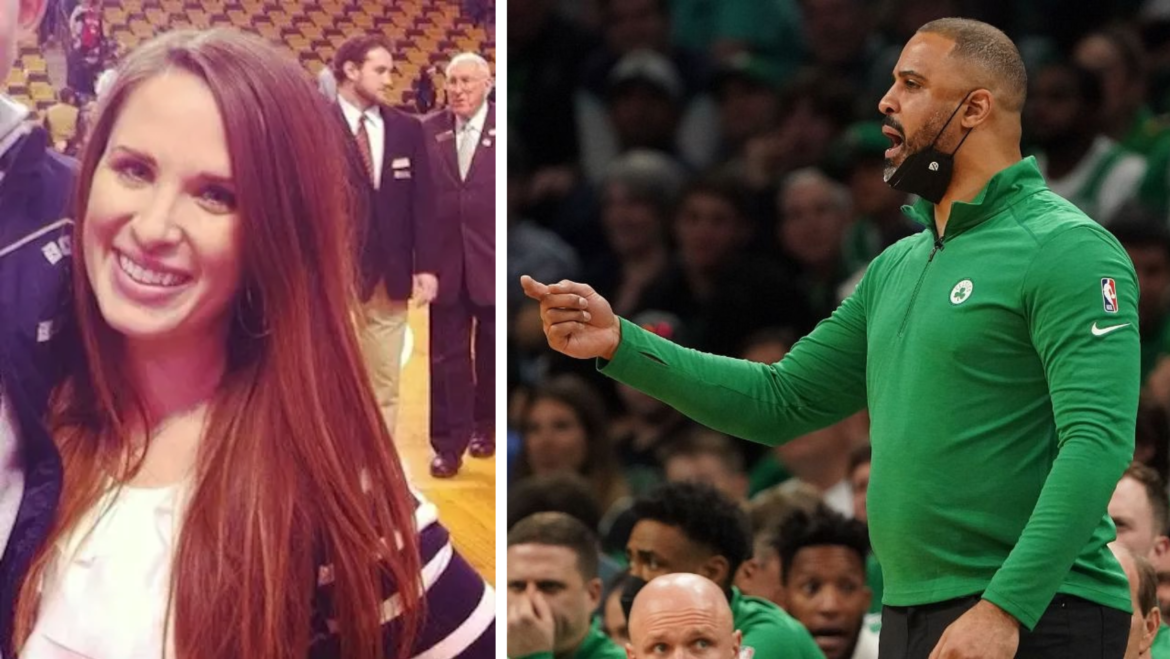Introduction: Who is Kathleen Nimmo Lynch?
Kathleen Nimmo Lynch is a name that has recently gained widespread attention due to her alleged involvement in the scandal surrounding former Boston Celtics head coach Ime Udoka. While she was previously known for her professional role within the organization, her sudden rise to public scrutiny has been anything but ordinary. The controversy that erupted in 2022 has shocked fans, analysts, and insiders, leading to heated debates and speculation about the nature of her relationship with Udoka. But who exactly is Kathleen Nimmo Lynch, and why has she become the center of one of the biggest NBA scandals in recent history?
The Role of Kathleen Nimmo Lynch in the Boston Celtics Organization
Before the scandal, Kathleen Nimmo Lynch was well-respected in the Boston Celtics organization. She held a position in the team’s operations and was crucial in handling various logistics and managerial responsibilities. Reports suggest she was deeply involved in the team’s day-to-day affairs, working closely with the management and coaching staff. Her work often required her to coordinate travel plans, oversee internal communications, and maintain the team’s structure behind the scenes. Given her position, it was inevitable that she would have interactions with the coaching staff, including Ime Udoka.

The Scandal That Shook the NBA
The controversy surrounding Ime Udoka and Kathleen Nimmo Lynch became public in September 2022. Reports surfaced that Udoka had engaged in an inappropriate and consensual relationship with a female staff member of the Boston Celtics. While initial reports withheld the staff member’s identity, further investigations and speculations pointed toward Kathleen Nimmo Lynch as the alleged individual involved. This revelation led to a media frenzy, with various outlets attempting to piece together the scandal’s details.
The Boston Celtics management conducted an internal investigation, eventually resulting in Udoka receiving a season-long suspension. The organization stated that he had violated team policies, though they did not provide specific details on the nature of those violations. However, it was widely understood that the relationship breached professional conduct standards set by the organization. This disciplinary action marked a significant moment for the Celtics, as they were forced to address an issue that could disrupt the team’s focus and cohesion.
The Fallout and Consequences
The fallout from this scandal was immense, affecting not only the individuals involved but also the Boston Celtics as a whole. Ime Udoka, who had led the team to the NBA Finals in the previous season, was suddenly removed from his position, leaving the team to navigate the turmoil without their head coach. His suspension raised questions about leadership within the organization and how such a situation could have been handled differently.
For Kathleen Nimmo Lynch, the situation was equally challenging. Although she did not publicly comment on the matter, her name became a topic of widespread speculation and discussion. The invasion of her privacy and the intense scrutiny she faced were significant, as media outlets and social media platforms dissected every aspect of her life. This led to ethical debates about whether such personal matters should be made public and how organizations should manage internal relationships to prevent such incidents.
Ethical Concerns and Workplace Relationships in Professional Sports
The Ime Udoka scandal and Kathleen Nimmo Lynch’s alleged involvement raised ethical concerns regarding workplace relationships in professional sports. While personal relationships between consenting adults are common, they can become problematic when they involve power dynamics, workplace policies, and professional responsibilities. In cases where a superior-subordinate relationship exists, it can lead to conflicts of interest, favoritism, and potential legal issues.
Many organizations, including NBA teams, have strict policies regarding relationships between staff members, particularly between high-ranking officials and subordinates. These policies are designed to maintain professionalism, prevent conflicts of interest, and protect individuals from situations that could compromise their careers. The Udoka-Lynch situation highlighted the challenges organizations face when such policies are not strictly followed or when individuals engage in relationships that may become problematic.
Public Reaction and Media Coverage
The scandal received intense media coverage, with various news outlets, sports analysts, and fans weighing in on the situation. Some defended Udoka, arguing that his punishment was too severe for what was reportedly a consensual relationship. Others believed the Boston Celtics were justified in taking action, as they needed to uphold the organization’s integrity and protect their workplace culture.
Kathleen Nimmo Lynch, on the other hand, received a mix of sympathy and criticism. Some believed that she was unfairly targeted and that the media’s focus on her identity was inappropriate. Others questioned her professional judgment, given the potential implications of her alleged relationship with Udoka. The discussion also extended to issues of gender dynamics, with many pointing out how women in scandals are often scrutinized more harshly than their male counterparts.
Social media played a significant role in amplifying the controversy. Various platforms were flooded with discussions, memes, and theories about the scandal, with some individuals going as far as to invade Lynch’s privacy. This incident again highlighted the darker side of public exposure, where personal matters become subject to mass judgment and speculation.
Lessons Learned and Moving Forward
The Ime Udoka and Kathleen Nimmo Lynch scandal is a cautionary tale for professional organizations. It emphasizes the importance of clear policies, ethical workplace behavior, and proper management of personal relationships. While workplace romances are not uncommon, they must be navigated with caution to avoid potential conflicts and reputational damage.
The scandal was a wake-up call for the Boston Celtics to reinforce their internal policies and ensure that all staff members adhere to professional standards. The organization had to refocus on basketball while addressing the internal challenges that arose from the controversy. The impact of Udoka’s suspension was significant, but the team ultimately moved forward with new leadership.
For Kathleen Nimmo Lynch, the controversy placed her in an uncomfortable spotlight, exposing the harsh realities of public scrutiny. Regardless of the situation’s specifics, her experience underscores individuals’ challenges when personal matters become public. The balance between privacy and accountability remains complex, particularly in high-profile industries like professional sports.

Conclusion: A Scandal That Will Be Remembered
The scandal involving Kathleen Nimmo Lynch and Ime Udoka will be remembered as one of the most talked-about controversies in recent NBA history. It sheds light on workplace relationships, ethical concerns, and the power of media in shaping narratives. While the dust has settled, the discussions surrounding the incident continue, reminding organizations and individuals alike of the importance of professionalism and discretion in the workplace.
Ultimately, the situation reminds us that personal choices can have far-reaching consequences, particularly in environments where public perception matters. The lessons learned from this scandal will likely influence how organizations handle similar situations, reinforcing the need for accountability, transparency, and ethical conduct in professional settings.
Also, Read The Following: Marshall Coben.


